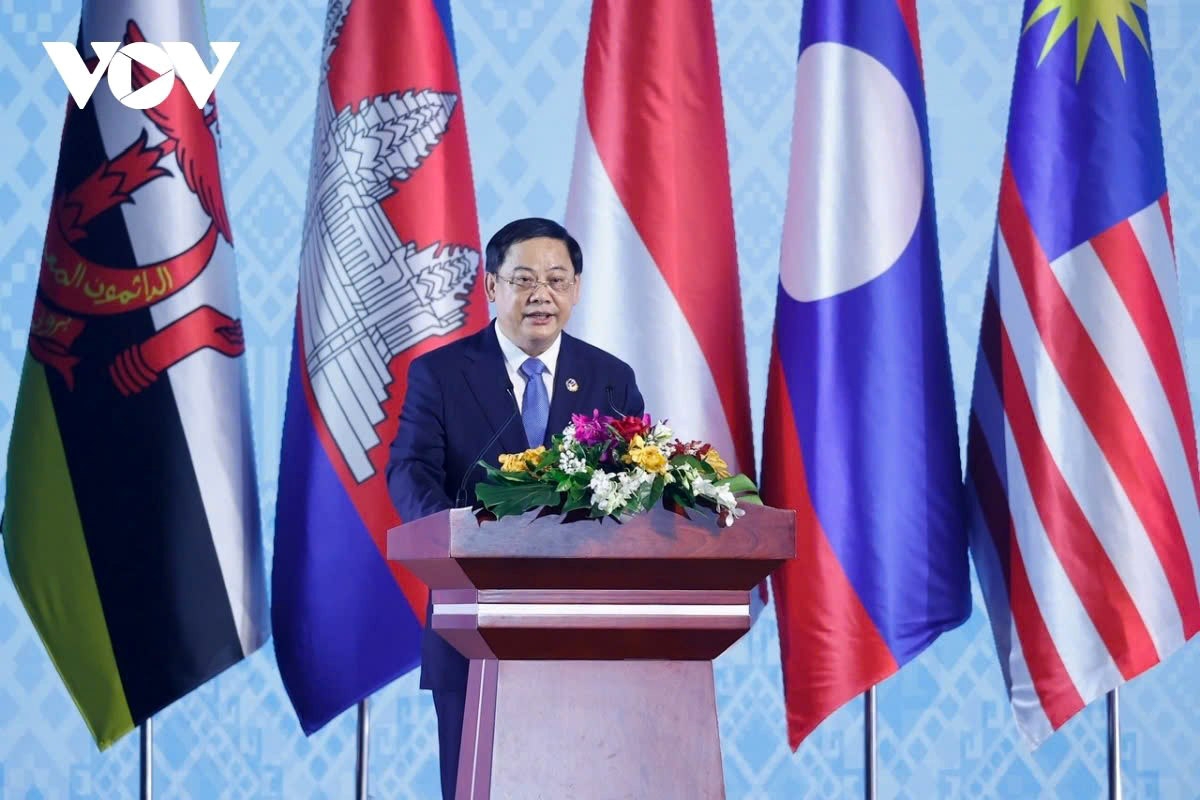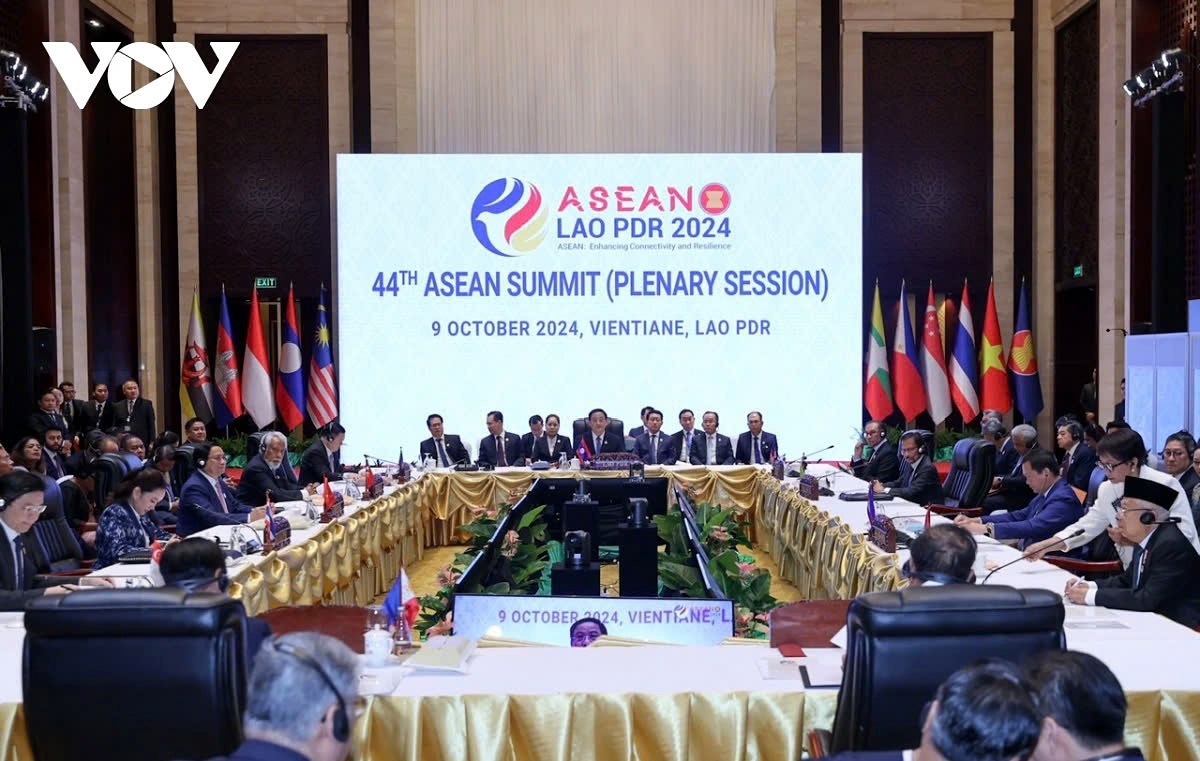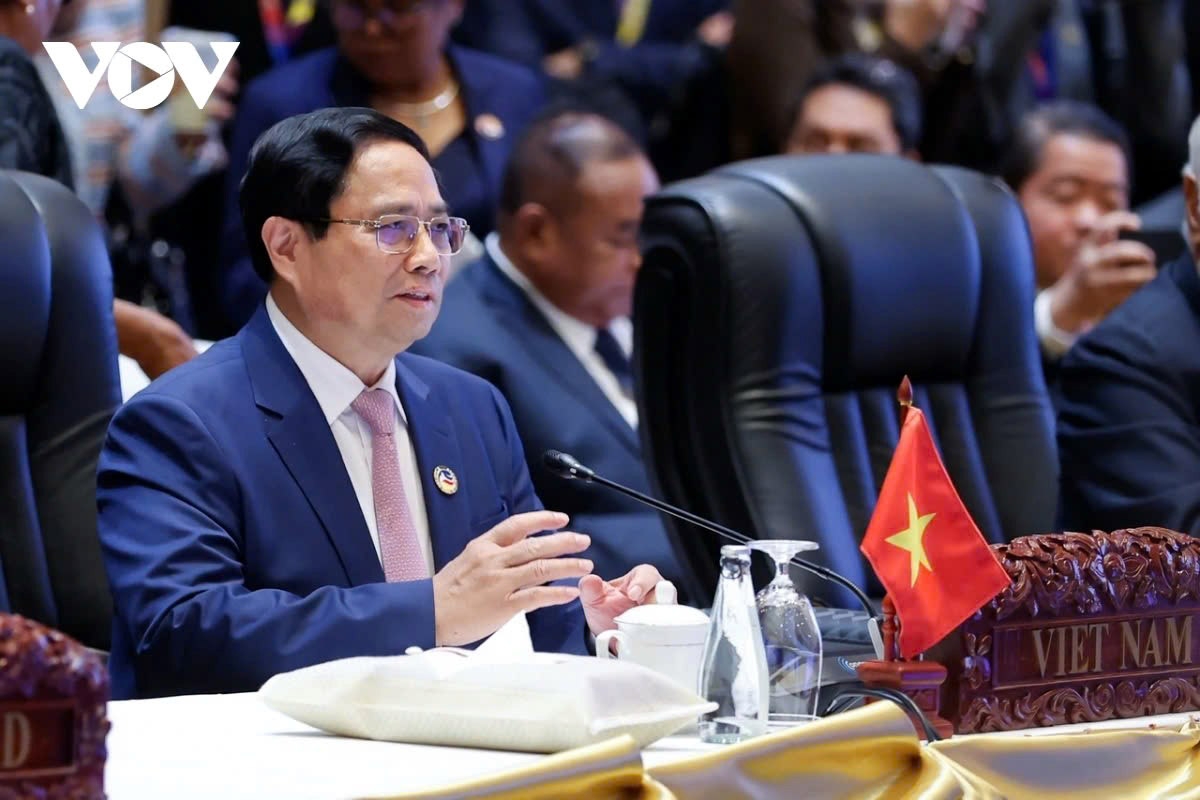ASEAN shows resolve to enhance connectivity and resilience
VOV.VN - The 44th and 45th ASEAN Summits opened in Vientiane, Laos, on October 9, demonstrating the grouping’s resolve to enhance connectivity and resilience in a rapidly changing world.
Closer cooperation amid global challenges

Welcoming delegates to the event, Lao Prime Minister Sonexay Siphandone noted that Laos, along with other ASEAN countries, has implemented nine priorities this year, recording many positive gains across all three pillars, particularly in developing strategies for the ASEAN Community Vision 2045. In the face of complex and unpredictable changes, ASEAN, like other regions around the world, faces numerous challenges such as conflicts, economic instability, financial risks, climate change, and natural disasters.
In this context, he said ASEAN needs to maintain its determination, enhance reliance, and continue efforts to strengthen cooperation in order to seize opportunities and effectively respond to challenges. The Laos PM expressed his belief that by upholding the spirit of cooperation, trust, and mutual support among member countries, ASEAN will continue to reap new successes.
These summits give members countries the chance to review the progress in building the Community, outline directions for development and cooperation, further strengthen relations with partners and lay a foundation for sustainable development of the ASEAN Community, contributing to peace, security, and stability, he stressed.
In his opening remarks, General Secretary and President of Laos Thongloun Sisoulith thanked expressed other ASEAN member countries and international friends for providing valuable assistance and support to Laos during its three terms as ASEAN Presidency since joining the bloc in 1997.
Throughout its development, ASEAN, a regional organization characterized by its inherent diversity, has overcome many challenges and marked its growth with the establishment of the Community in 2015. Today, ASEAN is home to over 700 million people, ranking as the third largest economy in Asia and the fifth largest in the world, and it is projected to rise to fourth position by 2030, he noted.
Affirming ASEAN as an important pillar in Laos’s foreign policy of peace, independence, friendship, and cooperation, Sisoulith stressed that Laos is committed to fulfilling its obligations and responsibilities with a high sense of accountability for the common benefit of ASEAN.
He also emphasized that with Timor-Leste set to become a full member in the near future, ASEAN will encompass all Southeast Asian nations, strongly affirming the region’s diversity and vast potential while opening new opportunities for cooperation with partners.
Under the theme “ASEAN: Enhancing Connectivity and Resilience,” priorities and initiatives during Laos’ ASEAN Presidency will contribute to the common goal of building a more connected and resilient ASEAN community. This also reflects Laos’ desire and effort to transform from a landlocked country into a regional and international connectivity hub, he said.
A Productive Year ASEAN 2024

After the opening ceremony, ASEAN leaders held the 44th ASEAN Summit (plenary session), examining cooperation within ASEAN and between ASEAN and its partners.
According to the ASEAN Secretary-General’s report, ASEAN has made significant progress in cooperation during the years despite challenges both within and outside the region. The ASEAN Community Blueprints 2025 are entering the final implementation phase across all three pillars, especially in the ASEAN Political-Security Community Blueprint with the implementation rate reaching 99.6%.
ASEAN has maintained a positive economic growth momentum and continues to be an attractive investment destination, with total foreign direct investment in 2023 reaching US$$230 billion, ranking second after the United States. ASEAN frameworks such as the Digital Economy Framework Agreement, the Blue Economy Framework, and the Circular Economy Framework provide a foundation for the grouping to quickly adapt to new development trends, creating momentum for quality and sustainable growth in the future.
ASEAN leaders congratulated Laos on the positive results ASEAN has recorded in 2024, commending the initiatives and priorities implemented across all three pillars of the Community, including formulating strategies to realise the ASEAN Community Vision 2045, enhancing supply chain connectivity, narrowing development gaps, improving health resilience and climate resilience, and increasing the role and participation of women and children.
They agreed on the need to further specify and deepen the concepts of connectivity and resilience in cooperation strategies in the new phase, as well as enhancing ASEAN’s adaptability in the face of the extensive and complex changes regionally and globally.
Welcoming new progress in cooperation between ASEAN and its partners, the leaders underscored the importance of maintaining ASEAN’s strategic balance in external relations, continuing to encourage partners to respect ASEAN’s central role, and promoting dialogue, cooperation, and trust alongside the grouping. They emphasized upholding the rule of law and contributing constructively and responsibly to peace, security, and stability.
Connectivity, resilience and innovation - key to new success

Addressing the summit, Vietnamese Prime Minister Pham Minh Chinh first praised ASEAN countries for their solidarity and mutual support in addressing the aftermath of Typhoon Yagi, which affected several member states, including Vietnam.
In the context of an increasingly volatile world, he said ASEAN continues to be a bright spot in the global economy, serving as a bridge for dialogue and cooperation and a focal point for regional integration and connectivity processes. ASEAN frameworks for the digital economy, blue economy, and circular economy are gradually shaping new cooperation paradigms in the region.
Welcoming the theme of the summit, Chinh said now more than ever, ASEAN needs to use resilience as a foundation for growth, focus on connectivity as a core element for breakthroughs, and leverage innovation as a driving force to lead the way.
To this end, he outlined major orientations for ASEAN’s development moving forward. According to the Vietnamese PM, resilience and strategic autonomy are the foundations for ASEAN to stand firm against all fluctuations and overcome challenges.
ASEAN needs to strengthen solidarity and unity in diversity, remain steadfast in its principles of conduct, and uphold its principled stance on international and regional issues. ASEAN should enhance its reliant capacity, leverage internal resources to maintain strategic stability, and respond promptly to external risks, he stressed.
The Prime Minister expressed confidence that Timor-Leste’s early membership will further strengthen ASEAN’s resilience and the region as a whole.
Chinh also maintained that ASEAN must sustain its central role, independence, balance, and principled stance in external relations, while expanding and diversifying partnerships based on effectiveness, substantiveness, and mutual benefit.
He stressed the need to promote intra-bloc connectivity combined with external connectivity, public-private partnerships, and multi-sectoral connections, focusing on infrastructure, institutions, and people, as strategic breakthroughs for ASEAN.
ASEAN needs to increase investment in high-quality infrastructure, especially strategic ‘hard’ and ‘soft’ infrastructure, and encourage third-party participation and collaboration with non-ASEAN partners. The grouping should facilitate the harmonization of institutions to promote trade in goods, services, and investment, as well as enhancing people-to-people connectivity to facilitate travel for citizens, entrepreneurs, and workers.
In his views, innovation is the driving force for ASEAN to keep up with, progress alongside, and surpass the region and the world. ASEAN needs to boost cooperation in developing an innovation ecosystem, establish regional digital cooperation frameworks, and develop governance criteria for emerging technologies, including artificial intelligence. It should focus on people as the center and driving force of innovation, by enhancing cooperation in education and training to cultivate high-quality human resources that meet the demands of the new era.
As ASEAN is preparing for a new phase of development, Chinh said Vietnam will continue to host the ASEAN Future Forum in 2025 and looks forward to the continued interest and support of countries for the successful organization of this event.
He also affirmed Vietnam’s support and close cooperation with Malaysia in its role as ASEAN Chair in 2025 to reap new successes in commemoration of the ASEAN Community’s 10th anniversary.



